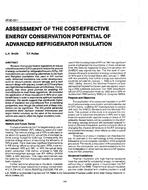
AT-90-22-1 — Assessment of the Cost-Effective Energy Conservation Potential of Advanced Refrigerator Insulation
- Comments Off on AT-90-22-1 — Assessment of the Cost-Effective Energy Conservation Potential of Advanced Refrigerator Insulation
- ASHRAE
States that proposed federal regulations to reduce chlorofluorocarbon (CFC) use and to reduce the amount of energy consumed by refrigerator/freezers (R/Fs), R/F manufacturers are considering alternatives to the foam and fibreglass insulations now used in R/F cabinet walls. Notes that advanced insulations now under development, such as vacuum powder, vacuum aerogel and a hard vacuum design with spacers contain no CFCs and have very high thermal resistances per unit thickness. Consequently, they show great promise for enabling R/F manufacturers to meet these regulations. Describes the simulation of the application of these insulations in R/Fs on a cost/benefit basis to examine the optimum insulation thickness. States the results suggest that significantly higher levels of insulation are cost-effective from a marketing perspective even though their added cost can be significant. The thin-profile advanced insulations allow narrower sidewall thicknesses and larger interior volumes, so the value of the increased volume was used to offset the higher insulation costs.
KEYWORDS: Thermal insulation, refrigerators, freezers, energy conservation, marketing costs, economics.
Citation: Symposium Papers, Atlanta, GA, 1990
Product Details
- Published:
- 1990
- Number of Pages:
- 8
- File Size:
- 1 file , 1.1 MB
- Product Code(s):
- D-18534

